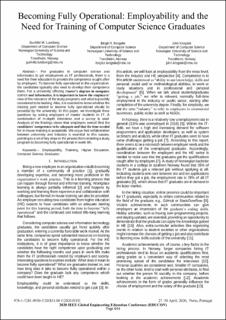| dc.contributor.author | Lundberg, Gunhild Marie | |
| dc.contributor.author | Krogstie, Birgit Rognebakke | |
| dc.contributor.author | Krogstie, John | |
| dc.date.accessioned | 2021-09-03T11:03:56Z | |
| dc.date.available | 2021-09-03T11:03:56Z | |
| dc.date.created | 2020-06-04T14:07:02Z | |
| dc.date.issued | 2020 | |
| dc.identifier.citation | IEEE Global Engineering Education Conference, EDUCON. 2020, 644-651. | en_US |
| dc.identifier.issn | 2165-9559 | |
| dc.identifier.uri | https://hdl.handle.net/11250/2772838 | |
| dc.description.abstract | For graduates in computer science and informatics to get employment as IT professionals, there is a need for their education to provide the competence sought after by employers. To become fully operational in the organization, the candidates typically also need to develop their competence there. For a university offering master's degrees in computer science and informatics, it is important to know the employers' view of the relevance of the study programs and what is possibly considered to be lacking. Also, it is essential to know whether the missing part needed to become fully operational should be provided by the university. In this paper, we investigate these questions by asking employers of master students in IT. A combination of in-depth interviews and a survey is used. Analysis of the findings shows that employers overall find the candidates' competence to be adequate and that the time needed for in-house training is acceptable. We argue that collaboration between university and industry is essential to this success, pointing to a set of key steps in the process from entering a study program to becoming fully operational in work life. | en_US |
| dc.language.iso | eng | en_US |
| dc.publisher | Institute of Electrical and Electronics Engineers (IEEE) | en_US |
| dc.title | Becoming Fully Operational: Employability and the Need for Training of Computer Science Graduates | en_US |
| dc.type | Peer reviewed | en_US |
| dc.type | Journal article | en_US |
| dc.description.version | acceptedVersion | en_US |
| dc.source.pagenumber | 644-651 | en_US |
| dc.source.journal | IEEE Global Engineering Education Conference, EDUCON | en_US |
| dc.identifier.doi | 10.1109/EDUCON45650.2020.9125188 | |
| dc.identifier.cristin | 1813875 | |
| dc.description.localcode | © 2020 IEEE. Personal use of this material is permitted. Permission from IEEE must be obtained for all other uses, in any current or future media, including reprinting/republishing this material for advertising or promotional purposes, creating new collective works, for resale or redistribution to servers or lists, or reuse of any copyrighted component of this work in other works. | en_US |
| cristin.ispublished | true | |
| cristin.fulltext | original | |
| cristin.qualitycode | 1 | |
